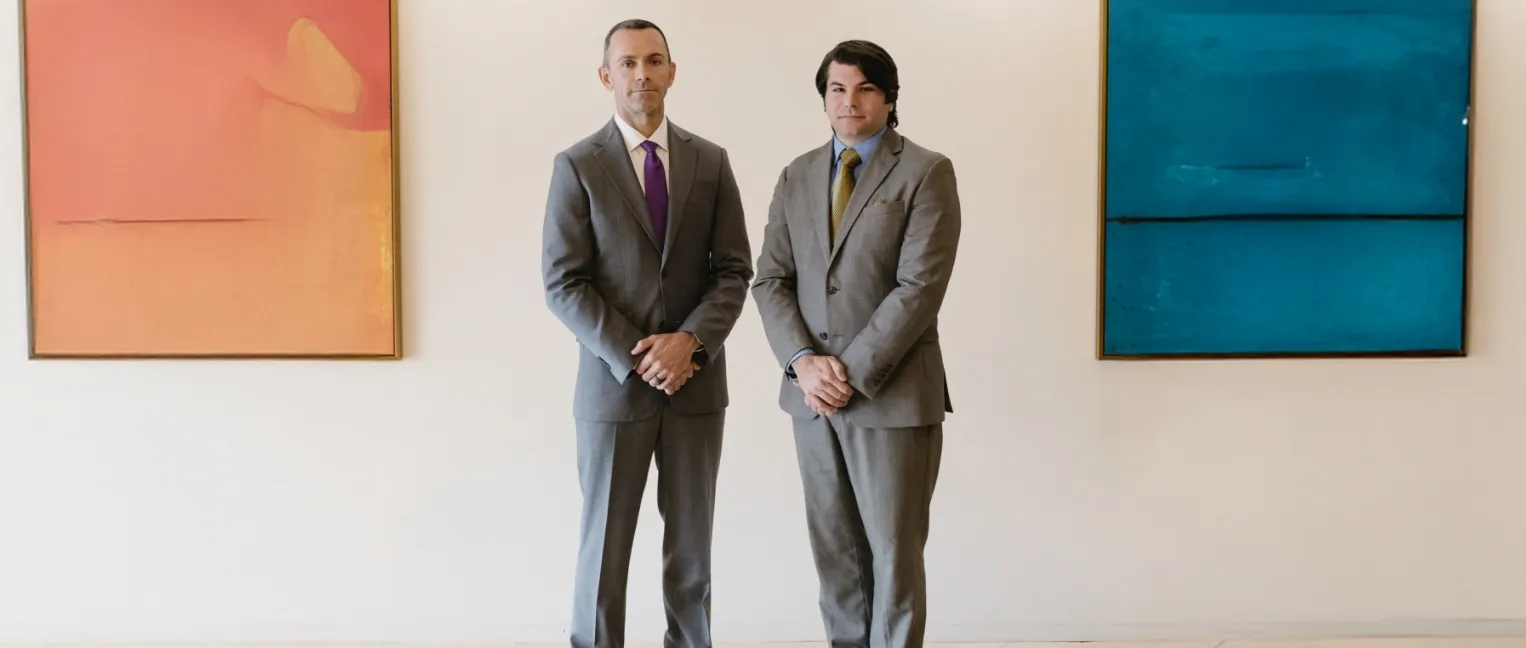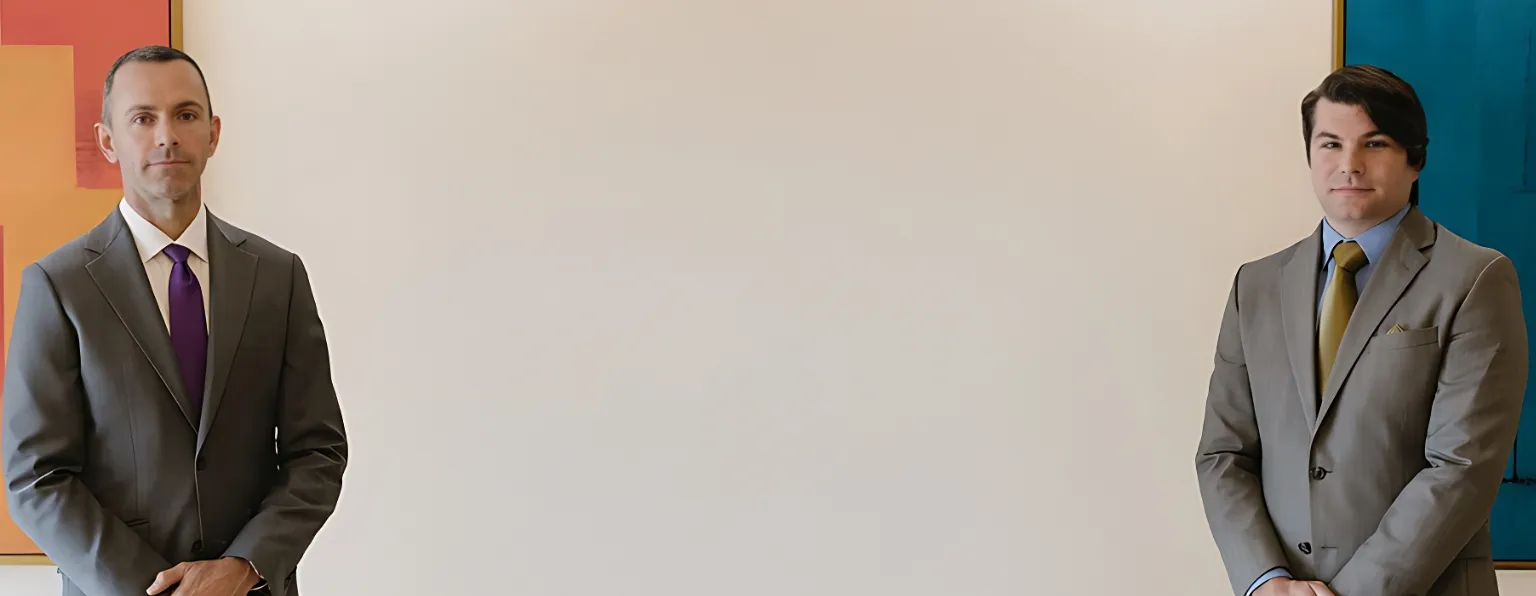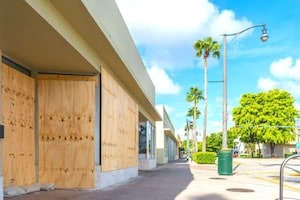
A big part of owning and managing a business is preparing for the inevitability of the unexpected. For the 2.8 million small businesses in Florida (comprising 98 percent of the companies in the Sunshine State), that means preparing both your people and your property for the possibility of hurricane damage. This is especially true if you’re located along the coastal regions.
Florida business owners may have access to several types of commercial insurance coverage and disaster assistance to help buoy them financially in the wake of a natural disaster. As it stands, there’s no such thing as a single, standalone commercial hurricane insurance policy for businesses. It’s often a patchwork of coverage options. Navigating the claims process to keep your business afloat can be incredibly stressful. Our weather-related accident attorneys in Fort Myers can help.
Contact us today at (239) 277-0005 or online to schedule a free case review.
Post-Hurricane Financial Recovery Resources
Some avenues of financial recovery for Florida businesses post-hurricane may include:
- Business interruption insurance.
- Contingent business interruption insurance.
- Commercial flood insurance (or National Flood Insurance Program claims).
- Building ordinance insurance.
- Utility interruption insurance.
- Inland marine insurance
- Spoilage insurance.
In addition to these, businesses might find temporary relief with:
- Economic injury and physical damage loans through the U.S. Small Business Administration
- Florida Small Business Emergency Bridge Loan Program, administered by the Florida Department of Economic Opportunity
- Disaster assistance from FEMA (Federal Emergency Management Agency)
- Tax relief measures, such as postponing certain filing and payment deadlines
This isn’t an exhaustive list, but it’s a good starting point.
Despite these resources, businesses too often find themselves going under while trying to work through the red tape to get the help they need to stay afloat. Insurance companies as a whole unfortunately have a well-earned reputation for wrongfully denying claims, delaying the claims process, and low-balling faithful customers. Our Fort Myers personal injury attorneys help companies through every step in the process – reviewing policies, investigating claims, gathering key evidence, filing claims, negotiating settlements, and (if necessary) pursuing litigation.
Why Are Hurricanes So Costly for Florida Business Owners?
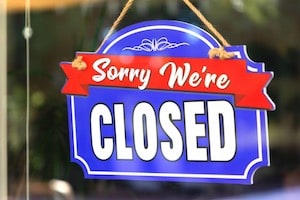
The NOAA’s Office for Coastal Management notes that of all the weather disasters throughout recorded U.S. history, hurricanes (also known as tropical cyclones) have caused the most death and destruction – by a long shot. In 2021, there were 20 separate weather climate disasters in the U.S. that cost $1 billion or more – the third-most on record, behind 2017 and 2005.
The U.S. Congressional Budget Office estimates average annual economic losses from hurricane winds and storm-related flooding is somewhere around $54 billion, with commercial businesses accounting for about $9 billion of that. However in 2022, Hurricane Ian’s impact blew that figure out of the water. By some estimates, the economic impact of Ian was around $75 billion (possibly more), pushing total losses for extreme weather disasters for that year to about $100 billion.
In the years to come, hurricanes and other natural disasters are expected to continue inflicting ever-costlier damages to Florida businesses.
As our South Florida hurricane damage commercial insurance claims attorneys can explain, the effects of a hurricane’s damage to local businesses can drag on for as long as 2-3 years. Among some of the setbacks businesses face as a direct result of these storms:
- Business closures – for days, weeks, or even months on end. Without business interruption insurance, consequent revenue losses may never be recovered.
- Customer cancellations. In regions that rely heavily on tourism, natural disasters will have customers canceling quickly. Even once your doors reopen, it may take a while for the customers to return.
- Extensive property damage. This can also force companies to close for weeks or months on-end.
- Supply chain disruption. Hurricanes can cause major supply chain headaches, from suppliers being directly impacted to transport routes that are blocked or heavily congested. This can impact a business’s ability to fully reopen.
- Product spoilage. Companies that stock products requiring special storage conditions like constant refrigeration may have to pitch those products at a loss, as they’re no longer safe for use or consumption. Agricultural companies may have crops or equipment destroyed.
- Displaced or injured employees. Even if your business structure is intact and safe, full-scale reopening may not be possible if your workers can’t show up. Hopefully they are physically unharmed, but even so – they may have lost their homes, vehicles, etc. It can take a while for staffers to get back on their feet so operations can run at full capacity once again.
Calculated preparation can sometimes ward off the worst of these impacts, but a lot of it depends on the type of operation you have and the size of the storm.
Insurers have been known to deny claims for these and other losses citing things like pre-existing damage, lack of adequate documentation, policy exclusions, etc. This can be incredibly frustrating when all you want to do is get back to work.
Attorneys Help With Florida Business Hurricane Damage Claims
If your South Florida business has been directly impacted by a tropical storm, hurricane, or tornado, our attorneys can help you navigate the insurance claims process.
Nine of the 10 costliest natural disasters in U.S. history have been hurricanes. Florida isn’t the only state that gets lashed by these storms each season, but we’re at the top of the list for total number of annual storms as well as economic losses. Since the 1850s, Florida has been hit with more than 120 hurricanes – one-third of those being classified as “major.”
Florida law – specifically F.S. 627.0629 – requires property insurance policies to include “hurricane coverage” for any wind damage caused by an officially-declared hurricane. Usually, this is not a separate policy, but rather comes standard in most homeowners’ insurance policies. Storms are categorized by wind speed, rising from “tropical storm” designation to “hurricane” once winds reach 74 miles-per-hour. Hurricane coverage typically covers damage to both the building’s interior as well as property inside, so long as it’s established the cause was rain, sand, dust, or sleet blown in by direct wind force. The term “wind storm” encompasses not just wind gusts, but rain, hail, tornadoes, and cyclones caused by hurricanes.
Insurers are always going to be focused on their bottom line. For Florida business owners, it’s not only their own financial security and livelihood on the line – it’s that of their employees too. There’s also the well-being of the customers that count on them. It’s important for business owners to make sure they have covered all bases with hurricane insurance damage claims – and that they’re taking advantage of any loans, grants, or other assistance for which the business, the employees, or the customers may be eligible.
Business insurance claims for which our legal team can provide assistance:
- Business interruption claims. Florida business interruption insurance is usually an add-on rider to a company’s property/casualty insurance of comprehensive or “all risk” package policies. Essentially, if you have to shut down your business operations due to circumstances outside your control (natural disaster, government evacuation orders, government shutdown orders, etc.), business interruption insurance can help your company with things like: Lost income/profits, operating expenses, temporary relocation, payroll, taxes, loans, and extra expenses.
- Contingent business interruption claims. Contingent business interruption insurance and contingent extra expense coverage is an extension of business interruption insurance. This type of coverage reimburses companies that lose profits or incur extra expenses as a result of a key supplier business interruption. It’s most valuable for companies that rely heavily on a single/small number of suppliers, manufacturers, recipient businesses, neighboring businesses, or specific customer base.
- Building ordinance insurance. This type of coverage reimburses property owners after a covered loss for the cost of repairing or rebuilding that must be done in accordance with the most up-to-date building codes. Older structures may have been grandfathered in/not subjected to newer building codes, but if a hurricane requires you to repair or rebuild, you often must do so in accordance with the latest building code standards.
- Utility interruption insurance. This is sometimes referred to as off-premises power coverage – because the damage stems from property damage/loss due to a utility failure that occurred off site. A prime example would be hurricane-force winds knocking out transformers or other equipment essential to the power grid on which your business relies. Power may not be restored for days or weeks on end after a hurricane, resulting in damage to your goods or merchandise. Utility interruption insurance can help offset the costs.
- Spoilage insurance. For bars, restaurants, grocery retailers, pharmacies, warehouses, and other business establishments that stock and/or serve perishable goods, spoilage insurance coverage can provide reimbursement for lost or contaminated goods due to covered loss.
- Inland marine insurance. This is insurance coverage for products that are transported over land (i.e., via truck or train) and those stored temporarily in third-party warehouses. (This is as opposed to marine insurance, which covers losses for goods transported over water.) If your business regularly ships or receives products or equipment, inland marine insurance can cover losses if your shipping, warehousing, or third-party logistics partners are impacted by a natural disaster, accident, or other covered loss.
In addition to assisting our clients with investigating, filing, and pursuing these hurricane damage claims, we can also help clients when insurers act in bad faith. Florida bad faith insurance lawsuits are appropriate for holding insurers to account when they treat customers unfairly by denying legitimate claims, causing unnecessary delays, requiring inordinate amounts of paperwork, etc.
What Florida Flood Insurance Covers
Flooding is a major concern for coastal communities because of the potential for storm surge. Hurricane Ian in 2022 clocked storm surge heights of one-to-two stories that stretched several miles inland.
Flood insurance is typically purchased as a separate policy. A “flood” is defined as an excess of water on land that’s normally dry that affects two or more acres of land or two or more properties. According to the National Flood Insurance Program, flood insurance policies typically cover:
- Electrical and plumbing systems
- Furnaces and heaters
- Refrigerators, cooking stoves, and built-in appliances (dishwashers, etc.)
- Permanently-installed carpet
- Permanently-installed cabinets, paneling, and bookcases
- Window blinds
- Foundation walls, anchorage systems, and staircases
- Detached garages
- Fuel tanks, water well tanks, pumps, and solar energy equipment
The cause of the flood will have an impact on what’s covered and what isn’t. For example, if a sewer backup is a direct result of hurricane-related flooding on your property, then damage caused by the sewer backup would be covered. However, if the sewer backup wasn’t directly caused by the flooding, the resulting damage won’t be covered.
Florida Homeowners’ Association Hurricane Coverage
Florida has the second-highest number of deed-restricted communities in the U.S. (just behind California). Approximately 45 percent of Floridians live in these “HOA” communities, so called because they are governed and maintained by homeowners’ associations.
When it comes to hurricane insurance, condo and homeowners’ association fees typically cover the community’s master insurance policy. The Florida Condominium Act, F.S. 718.111(11), enacted after Hurricane Wilma in 2005, requires associations to provide adequate property insurance for the replacement cost of insured property as determined by an independent insurance appraisal determined once every 36 months, with deductibles based on available funds. Associations must provide primary coverage for all condominium property as originally installed or replacement of a like kind and quality in accordance with the original neighborhood specifications.
In general, “condominium property” that is covered with the HOA’s hurricane insurance includes all property not included in the confines of a unit. Individual homeowners (and renters) need their own separate policy to cover hurricane damage to their unit’s interior walls, floors, ceilings, and personal items.
If an HOA does not have the right type of insurance in place, the community may not be able to rebuild if it’s ravaged by a storm. If that is the case, homeowners may be able to take legal action against the board. If you have concerns about your HOA’s hurricane insurance coverage, it’s worth discussing those with an attorney.
Aside From Insurance, How Can Businesses Minimize a Hurricane Impact to Operations?
In addition to carrying an adequate amount of insurance, small and midsize businesses in Florida can sometimes lessen part of the impact of a hurricane or other natural disaster by implementing a continuity plan.
Continuity plans address things like protection of business records/IT infrastructure, working out means of communication with your people before, during, and after the storm, making workers aware ahead of time how payroll may be impacted, letting customers know what they can expect (to the extent you’re able to predict those facts), etc.
Hurricane-Related Roof Damage
Everyday exposure to the elements can have an adverse impact on a roof over time. But when a hurricane, tornado, or other major storm hits, the damage is often swift and extensive.
Examples of hurricane-caused roof damage include:
- Missing or damaged roof materials. High winds and torrential rain can easily tear away shingles, clay tiles, and other roofing materials.
- Damaged ridge vents or weather vents. Many newer homes in Florida have ridge venting or weather venting, which allow the release of moisture and hot air through attics/upper floors. Located at the roof peak, they’re vulnerable to damage from high winds and rain.
- Missing or shifted step flashing. This is a piece of metal bent to 90 degrees situated between shingles and a sidewall, dormer, or chimney to block water from worming its way under the shingles and destroying the underlying structure. These can be damaged by high-velocity winds.
- Damage to Eaves. Forceful hurricane winds whipping under the eaves can lift a roof entirely off a structure. Even if the roof is still attached, damage to eaves is a serious issue that often requires total roof replacement. Failure to address immediately can leave a structure vulnerable to mold, insect infestations, etc.
- Pipe jacks and boots damaged. Vent pipes protect roofs from moisture, and they’re tightly sealed with rubber boots. These can be damaged with high winds and hail commonly associated with hurricanes. Cracks might not be easily visible, so careful inspection is important.
- Skylights, attic fans, and vents that are compromised. These fixtures are tightly sealed to keep the elements out, but they can be damaged in hurricane-force winds.
Strong winds are often the most common culprit of roof damage in a hurricane. Still, there can be secondary issues as well. These include incidents like falling branches and trees, lightning strikes, and heat damage. Sometimes, depending on the circumstances, insurers will deny roof damage claims when these secondary issues are identified. It’s important to have an insurance claims lawyer review your policy to determine whether you have grounds to challenge such denials.
Florida Law on Hurricane-Damaged Roof Insurance Repairs
Florida has some of the most extensive roofing regulations in the country – mostly because there are so many storm-related claims filed each year.
While residential and commercial property roofs are among the most likely structural elements to suffer Florida hurricane damage, roof damage insurance is widely misunderstood. Fort Myers roof damage insurance claims attorneys recognize that recent changes to Florida roofing insurance laws have further complicated matters for many insureds.
One of those changes – Senate Bill 2D, effective as of 2022 – involved limiting insurers’ ability to refuse coverage for roof damage based on the age of the roof. The provision prohibits companies from denying coverage for roof damage for roofs less than 15-years-old. For older roofs, insurers must allow homeowners to conduct an inspection on the condition before deciding to refuse coverage. If the results of that inspection reveal there are 5+ years of use life left in the roof, insurers can’t deny coverage based on age.
The new law also states that if a roof complies with 2007 Florida building codes, insurers can opt to repair rather than replace the roof – even if it’s more than 25 percent damaged. Full replacement coverage is available for roofs under 10-years-old.
Property insurers can offer separate roof deductibles at a top rate of 2% of the residence coverage limit OR half the cost of replacing the roof – whichever is lower. Homeowners who opt for separate roof deductibles may be given a discount on their policies.
To cut down on insurance fraud, roofing contractors aren’t allowed to solicit door-to-door, and contractors/public adjusters can’t offer property owners incentives – nor can they accept incentives for referrals.
To help homeowners in coastal communities, the law also allocated funds to be provided as state grants of up to $10,000 for home-hardening projects – which include roof reinforcements. Completion of such projects opens the door to discounts on insurance premiums.
What Should I Do If My Roof is Damaged in a Hurricane?
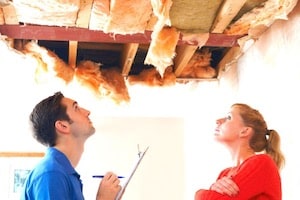
Florida property owners who suspect possible roof damage during a storm should prioritize scheduling a roof inspection as soon as possible. Sometimes post-storm roof damage is obvious, other times not. Issues to look for:
- Large holes in the roof.
- Broken or missing shingles.
- The rubber or plastic membrane of the roof being lifted.
- Roof buffeting.
- Any evidence of leaks.
- Sheathing that is missing or broken.
- Nails uplifted or separated.
- Damage to any equipment on the roof (satellite dishes, air conditioners, antennae, etc.).
While you’re waiting for an inspection, take pictures and video yourself (if you can do so safely). If necessary, mitigate the damage if possible (draping large tarps over exposed areas, use buckets or other containers to catch leaks, use fans to dry the area as much as possible and prevent mold, vacuum or mop standing water, etc.). Notify your insurer immediately about a possible claim. Reach out to an attorney if you feel overwhelmed by the process or feel that the insurer isn’t treating you fairly.
As far as how much time you have to file, F.S. 627.70132 previously granted claimants three years in which to file property insurance claims for hurricane damage – which includes roof repairs. However, recent legislative changes now require that roof-related claims – including supplemental and reopened claims – must be submitted within two years. Furthermore, if a homeowner wants to file a lawsuit against an insurer, they are required to submit written notice 60 days in advance.
Even two years can seem like a long while, but some policies can require notification of a potential claim in a much shorter time window. Plus, claims can be held up for many reasons. It is typically in your best interest with roof damage claims to act quickly.
Note that sometimes, there is little question that the roof has been damaged and little doubt regarding the cause. Yet insurers may justify a low-ball settlement offer based on factors like the type of roof, how old the roof is, pre-existing damage, improper prior maintenance, and related structural damage.
Other grounds on which claims may be denied include:
- Damage is excluded under your policy.
- The policy was canceled because premiums weren’t paid in a timely manner.
- Claim is inflated or fraudulent.
Knowing the law – and your rights – is essential when filing insurance claims and successfully negotiating settlements. Ensuring you receive a fair payout is the top priority for our South Florida hurricane and storm damage claims attorneys.
Contact Our Expert Attorneys Today
If you need help with your commercial hurricane damage insurance claim, our Southwest Florida law firm provides free initial consultations.
Contact our South Florida commercial insurance hurricane claims lawyers by calling (239) 277-0005 or contacting us online.
